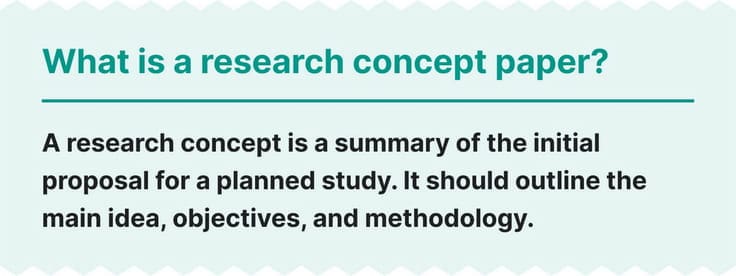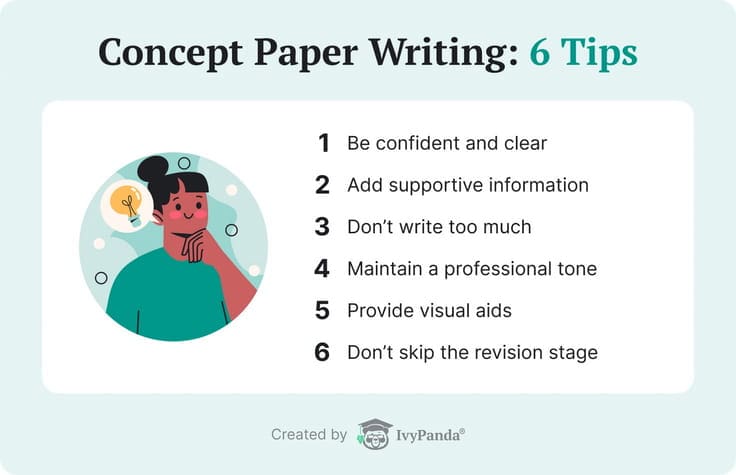Concept Paper Maker
The Concept Paper Maker turns your ideas into a clear, structured proposal. Whether you’re outlining a project or planning research, this tool helps you organize your thoughts into a solid concept paper that’s ready to go.
✨ Free Concept Paper Maker: Introduction
A concept paper is one of the first steps in implementing a research project. It involves describing your future study and laying out your ideas on a professional level, including:
- Your research goals,
- Relevant questions you’re planning to explore,
- Methods of data collection, and many other aspects.
Our free concept paper maker will assist you in getting started on a project and overcoming writer’s block. With its help, you’ll write an excellent concept paper quickly and easily.
Below, you can find all the details about using this generator, learn about its pros and cons, and get valuable writing tips.
🤩 Benefits of Concept Paper Maker Free Tool
Having a free, AI-powered helper by your side is always a huge relief for students occupied with multiple academic projects. Here’s how you can benefit from utilizing the functionality of our concept paper maker.
Concept Paper Maker Online: How It Works
Here’s how to use our free concept paper maker:
- Provide your research topic.
- State the intended audience and purpose.
- Explain why your project matters.
- Indicate the expected results.
- Click the “Make Concept Paper” button.
- Enjoy the ready-made concept paper sample!
📚 What Is a Research Concept Paper?
In a nutshell, a concept paper is an academic assignment that covers the fundamentals of the planned research project and serves as proof of your competence in this area.
It needs to clarify:
- What exactly you’re planning to study,
- Why the subject is research-worthy,
- What you will do to achieve the set research goals.
In other words, a concept paper is a brief summary of the larger project. It helps students identify gaps and weaknesses in their research rationale and develop a consistent justification for the planned study.

In terms of its purpose, a concept paper is similar to a research proposal, as it describes a research focus and enables early feedback from the supervising committee. Based on these insights, the student can refine the planned study’s structure and gain more confidence in their research.
Concept Paper vs. Research Proposal
As we’ve just noted, there are many similarities between a research proposal and a concept paper. To make sure you don't confuse them, take a look at their main distinctions:
Concept Paper
Research Proposal
What Questions Should Be Addressed in a Concept Paper?
A concept paper should answer the following essential questions:
- What problem are you addressing?
- Which stakeholders may find this issue significant?
- How will you achieve the research objectives?
- What research methods will you use?
- What are the benefits of your research project?
- What metric will you use to evaluate your study success?
- Who will participate in the research process?
✍️ How to Write a Concept Paper?
A concept paper is an excellent way of presenting your ideas persuasively and professionally. There is no rigid template or outline regarding this paper’s structure. However, certain conventions still exist.
Experts recommend including the following elements in your paper to increase your chances of successful application:

-
Decide on the purpose.
The “why” question should come first when writing a concept paper, as it will lay the basis for your research rationale. You should identify your objectives and determine the audiences for whom they are relevant. -
Select a sound topic.
While a purpose is a broad rationale for the project, a topic gives it a narrow focus and makes the research doable. Your topic may specify a location, population, or particular research approach that makes the project original. -
Come up with a title.
Now that you have a topic, shape it into an attention-grabbing and exciting title. Make it intriguing to motivate the reviewers to read the whole text. We recommend using our handy title generator to streamline this task. -
Research and gather data.
Next comes the detailed research on the chosen topic. Check what other scholars have found on the subject and how they approached the study. Using this evidence, you will be able to identify reliable sources. -
State the issue.
The initial research will expose the gaps and problems requiring attention. These gaps may be reformulated as an issue you will address in the forthcoming research project. -
Define your goals.
With a clear research topic and purpose in mind, you can formulate a list of concrete goals to address in the study. You may use the SMART tactic to develop actionable goals. -
Provide research questions.
Based on the purpose and objectives, develop a list of research questions and hypotheses. A research question is a query you pose at the beginning of the study. You then answer it with the help of data collected during research. -
Write a literature review.
The next step is a preliminary literature review. This part should contain key works of scholars in your field, core topics they discuss, and the findings they cover. -
State the methodology.
Another vital part of any concept paper is the research design you’re proposing. Make a detailed plan that will include the research type (qualitative or quantitative), your theoretical framework, data collection tools, approaches, the populations of your interest, etc. -
Create a timeline.
The timing of your research also matters when it comes to financing. That’s why you should give a realistic schedule of all important research steps to show how much time you will need to attain all objectives. -
Include references.
Giving credit to other scholars’ intellectual work is at the heart of professional academic conduct. Make sure to indicate all external sources on which you relied when composing the paper. Our citation maker can help with popular styles like APA, MLA, or Chicago.
How Long Is a Concept Paper?
There is no one-size-fits-all rule for determining your concept paper’s length. Typically, reviewers expect to see anywhere from one to five pages of text (most often 2-3 pages) in these assignments. Yet, some funding applications require longer and more detailed concept justifications – up to 20 pages.
What Are Good Research Question Examples?
When developing a concept paper, you should find an area that matches your professional interests and is within your competency. Here are some examples of research questions that will stimulate critical thinking:
- How is acid rain connected to local diesel vehicle use?
- How can the process of 5G network integration be accelerated in Texas?
- What are the legal constraints of surrogate mother service promotion in Alabama?
💡 Concept Paper Tips
Following our professional tips and recommendations, you can quickly improve your concept paper writing skills. Here are a couple of tricks to help you achieve the best results:

-
Be direct.
The choice of language and structuring of your material can make a real difference. It is important to sound confident and straightforward to get your message to potential funders or partners. -
Add credible statistics.
If possible, use statistics and numbers to support your project’s relevance. Also, consider mentioning how you will monitor progress toward planned objectives. -
Don’t write too much.
Staying within the word count is essential. Nobody would read a concept paper that’s 10+ pages long if the initial request were to write three papers at most. -
Maintain a professional tone.
A professional tone inspires confidence and forms an opinion of you as a serious researcher. It also demonstrates your respect for the subject matter. -
Provide visual aids.
Illustrations can help you clarify complex ideas, improve understanding, and make your proposal more memorable for the reader. -
Don’t skip the revision stage.
Editing and proofreading your content is an opportunity to strengthen its impact and improve the audience’s impression. Funders are unlikely to consider your idea if it’s presented in poorly written text with punctuation and grammatical errors.
We do hope that our free concept paper maker will help you complete your academic assignment quickly and efficiently. If you liked the article, don’t forget to share it with friends. We also recommend using our handy research question generator for your future tasks!
Updated:
📎 References
- Writing a Concept Paper. – Saint Augustine's University
- How to Write a Concept Paper Effectively. – Sunaina Sinha, Medium
- Tips for Writing a Concept Paper. – American University of Beirut
- Concept Notes. – University of Cape Town
- How to Develop a Concept Paper – University of Wisconsin-La Crosse
- How to Write a Concept Paper. – Rutgers, The State University of New Jersey
- What Should Be Included in a Concept Paper or Letter of Inquiry? – Stockton University
- How to Write a Concept Paper. – Loyola University New Orleans